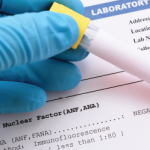“In either case, the test outcome will allow clinicians to immediately optimize the treatment regimen and increase clinical outcomes,” Dr. Van Stappen says.
He adds, “We would like to stress that, whatever assay is used, ultimately the patient’s wellbeing is most important. If he or she does not feel well and experiences a disease flare, one should make use of all available tools, including infliximab monitoring, to rapidly improve his or her health. Anybody who would like to collaborate with us to help us achieve this goal can always contact us.”
Dr. Van Stappen believes the eventual cost of the assay will be “slightly more expensive than a typical ELISA test as it clearly provides additional practical advantages. (In Europe, patients are charged roughly euro 30-60/per analysis by ELISA.) However, the price of the rapid test will still be in a reasonable and affordable range and will definitely modify the infliximab monitoring landscape.”
The researchers reported no commercial funding for the study and declared no conflicts of interest.
Reference
- Van Stappen T, Bollen L, Vande Casteele N, et al. Rapid test for infliximab drug concentration allows immediate dose adaptation. Clin Transl Gastroenterol. 2016 Dec 8;7(12):e206. doi: 10.1038/ctg.2016.62.
